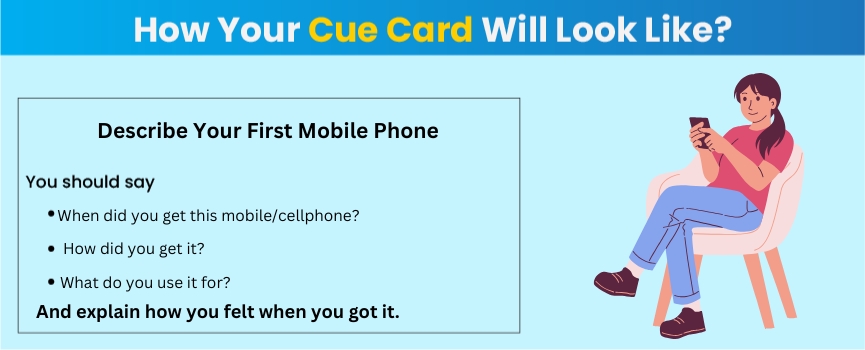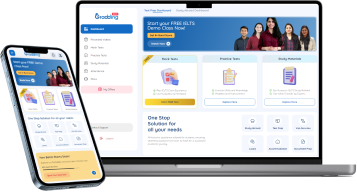Describe Your First Mobile Phone- IELTS Cue Card
Last updated: Nov 13, 2025The IELTS speaking section has different questions to see how well you speak, your word choice, and how clearly you share your ideas. One intriguing topic that may arise is "Describe Your First Mobile Phone.". It could be in part 2 or 3 of the test, so it's good to give a complete, interesting answer. This blog will show you how to organise your answer, so you do great on the IELTS speaking test.

Table of Contents
Introduction to IELTS Cue Cards
In the IELTS speaking part 2, you'll get a cue card with a topic on it. The card will give you some points to talk about in your answer. Often, you'll be asked to share a story or talk about someone, someplace, or something important to you. You will have a minute to jot down your thoughts, followed by two minutes to articulate your ideas. Once prepared, you may begin to express your views confidently. Now, let's discuss how to answer your cue card effectively.
How to Answer the Cue Card?
The key to a good cue card response is to be organised. Answer the question directly and keep your answer clear and easy to follow. Speak smoothly so the examiner can easily follow your reasoning. Your answer will be evaluated based on four key criteria: fluency and coherence, grammar, vocabulary, and pronunciation. Keep these things in mind while solving IELTS speaking part 2 for better scores.
Let's think about what you might say for the cue card question: “Describe Your First Mobile Phone”.
- When did you get this mobile/cellphone?
- How did you get it?
- What do you use it for?
- And explain how you felt when you got it.
Check out the image below for an example of what an IELTS speaking part 2 cue card might look like.

Describe Your First Mobile Phone - Sample 1
Here is the first sample response provided to help you achieve an 8+ band score in your cue card round.
When did you get your first cell phone?
A mobile phone has really become a must-have for everyone these days. It's hard to imagine life without one. I still remember the excitement of getting my very first cell phone. It was during my final year of college, about seven or eight years ago. My friends were already using their phones to chat with their families, and I was eager to join in too. The only problem was that I needed some money to buy one.
How did you get it?
Well, my parents were super supportive and knew I needed a phone even though I hadn’t actually asked them for one. They surprised me with a cell phone as a birthday gift. It was a Redmi 6, the latest model from Mi at the time. I had my eye on it because I knew it was a bit pricey, and some of my friends had it too.
What do you use it for?
I mostly use my phone for sending texts and making calls. Plus, the camera is pretty great, so I love taking pictures with it.
And how did you feel when you got it?
When my parents handed it to me, I was just over the moon. It was the newest model, and it had features that some of my friends didn’t even have yet. I felt so lucky and pleased. I used that phone for four whole years before finally switching to a Samsung. Even though I’ve moved on, my first phone will always hold a special place in my heart.

Describe Your First Mobile Phone - Sample 2
This second sample may also be helpful as you prepare for a great score in the IELTS speaking section. Look below:
When did you get this mobile phone?
I've been pestering my mom to get me a mobile for ages. She always said I wasn’t old enough and didn’t really need one. But eventually, she realised it was something I genuinely wanted, so she caved and took me shopping when I was about fifteen.
How did you get it?
I remember walking into the store feeling a bit clueless, so I asked the salesperson for help. We ended up picking the most affordable, basic phone they had. Honestly, I wasn't interested in all the fancy features; I just wanted something to call and text my friends.
What do you use it for?
I took such good care of that phone. It lasted me four or five years, and I remember spending around INR 150 on a cute leather case and INR 100 on a tempered glass protector to keep it safe. I played games and texted my classmates a lot before finally upgrading. Now my little brother is using that phone.
How did you feel when you got it?
Since it was my very first phone and my dad gifted it to me, it holds a special place in my heart.

 Access speaking Mock Test
Access speaking Mock Test Describe Your First Mobile Phone - Sample 3
Here's a third sample answer that should be useful for the cue card topic: “Describe Your First Mobile Phone”.
When did you get this mobile phone?
Mobile phones have been around for a while, but I got my first one a few years ago, and it took quite a journey to get it. I still vividly remember the day I finally got it. It was three or four years back when I was wrapping up my final year of college. All my friends had phones to stay connected with their families, and I really wanted one too, but my parents weren't on board with the idea.
How did you get it?
I never directly asked my parents for a phone, but they knew I needed one. On my birthday, they surprised me with a cell phone. They got me a Realme 8i, the latest model at the time. To be honest, I didn’t even ask how much it cost until I stumbled upon the bill one day while searching for some other papers. That’s when I realised they spent INR 9,999 on it. It was definitely a bit pricey and packed with cool features.
What do you use it for?
Even though my first phone was pretty advanced for its time, modern phones have a ton of features. I’m currently using one with 128 GB of storage, which is super handy. Plus, it has 64 GB of RAM, so I can access everything I need right at my fingertips. The camera is fantastic too, just like other high-end mobile cameras.
How did you feel when you got it?
I was so thrilled to get the phone. At that time, it was a super popular model. It came loaded with all the latest features, like an 8 MP camera, a media player, and pre-installed apps like Facebook and YouTube. It was like a little dream come true.
These three sample answers about Describe Your First Mobile Phone should give you some good ideas. Next, we'll look at some of the vocabulary used in these examples.


Lexical Resources
Earlier, we used some fancier words in the examples. Here, we'll give you the meanings of those words. This can assist you to learn more vocabulary for IELTS test.
| Words | Meaning |
|---|---|
| Tempered | Having a specified temper or disposition |
| Eager | Strongly wanting to do or have something. |
| Features | An important or noticeable part of something |
| Pestering | To annoy somebody |
| Vividly | Clear and detailed |
| Wrapping | Paper, plastic, etc. That is used for covering something to protect it |
| Stumbled | To trip or nearly fall |
| Fantastic | Extraordinarily good or attractive. |
| Thrilled | Very excited |
| Upgrading | To change something so that it is of a higher standard |
| Caved | Yeild to pressure |
| Clueless | Having no knowledge, understanding, or ability. |
| Genuinely | In a truthful way. |
| Pleased | Feeling or showing pleasure and satisfaction, especially at an event or a situation. |
Those are some good words to know for the cue card part of the test. Next up, we'll look at some possible follow-up questions for Part 3 of the IELTS speaking test.
Follow-up Questions with Answers
After the cue card part, you'll move on to Part 3. This is still about the same topic as Part 2. Expect the examiner to ask you around 5-7 follow-up questions about your cue card topic, like “Describe Your First Mobile Phone”. Give detailed answers with examples and stories from your life. Here are some questions they might ask you after Part 2.
1. What Kind of Phone do you Use Now, and why?
Answer: I currently use a popular brand called Samsung smartphones. I chose it because of its exceptional camera quality and its seamless integration with my other devices. I’m a bit of a tech enthusiast, and I need a phone that can handle multitasking, handle business apps, and provide a smooth user experience.
2. How Important Is Technology in your Communication Now?
Answer: It's fundamental. Technology is how I communicate with pretty much everyone: family, friends, and colleagues. I use instant messaging apps, email, and social media extensively, in addition to calls and video calls, and video chats. While I still value face-to-face communication, technology has become an inseparable part of my daily life for staying in touch, working remotely, and even just for entertainment.
3. Do you Think People Were More or Less Happy Before Mobile Phones?
Answer: That’s a tough question. I don’t think it’s a case of one being definitively better. In the past, people had deeper, more present in-person interactions, and perhaps more peace of mind without the constant digital noise. However, today’s technology offers so much convenience and access to information, which also contributes to happiness and a feeling of being connected in different ways. People likely found happiness through different means and at different paces depending on the era.
4. What Features of Your First Phone Do you Miss from Today’s Perspective?
Answer: While I don’t miss the lack of functionality, I do find myself missing the simplicity and durability of the older phones. They were much more robust, and the batteries truly lasted forever. You didn’t have the same anxiety about changing it every night. It’s a bit ironic, but I miss the days when a phone was just a phone and I didn’t feel the pressure to constantly check social media or worry about it being out of date.
So, those are some possible follow-up questions and answers for the Describe Your First Mobile Phone cue card. Now, let’s talk about how to do well on the IELTS cue card part.

Tips to Excel in IELTS Cue Card
Here are things you can do to get a great score, like an 8 or higher, on the cue card part. Here are some ideas:
- Speak clearly, not fast. If you take your time, you’ll be able to organise your thoughts and you won’t make mistakes.
- Set a timer for two minutes and just talk about different topics. This helps you speak without pausing too much.
- Don't use complicated words just to show off. It sounds unnatural. Use language that you normally use.
- Learn new words to help you explain what you mean.
- Expand your language skills by studying words, phrases, and sayings on different topics.
- Practice speaking English regularly with your friends, family, or language partners to get better.
- Use your voice to emphasise important stuff.
Conclusion
In conclusion, the IELTS Speaking section is often viewed as one of the more demanding components of the IELTS exam, necessitating targeted strategies for effective performance. In this blog, we have explored the cue card topic “Describe Your First Mobile Phone,” along with sample responses.
In addition, we have provided lexical resources and practical tips to support your success in the IELTS Speaking cue card round. Should you encounter challenges or wish to delve deeper into the speaking segment, we invite you to consider joining our offline or online IELTS classes at an affordable price. In addition, after completing the exam, feel free to utilize our IELTS band score calculator tool to estimate your scores.
0 comments

Practice Makes a Man Perfect!Take FREE ielts Mock Tests
Start FREE Mock TestPredict your IELTS Band

98% students got exact IELTS Band
What is your Target IELTS Band?
Get familiar with the Real IELTS Exam for Free!
Start Free Mock TestWe are available in :
BangaloreAhmedabadJaipurHyderabadKeralaPuneChandigarhMumbaiGurgaonChennaiKolkataTrivandrumNoidaKochiCalicutKottayamKollamThrissurIndoreUdaipurdisclaimer:logos and other registered trademarks of universities used on this platform are held by their respective owners. Gradding does not claim ownership or association on them, and their use is purely for informational and illustrative purposes.











